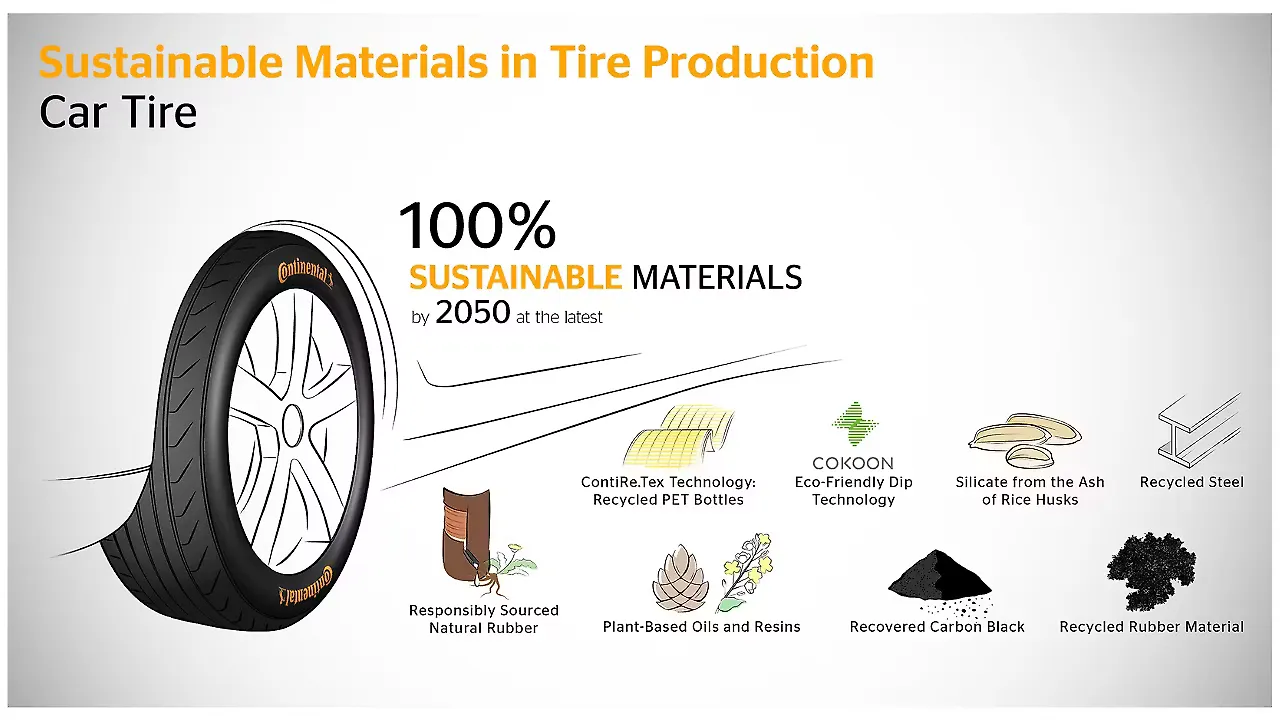
For over a century and a half, Continental has consistently pioneered tyre design, engineering, and manufacturing on a global scale. In the ever-evolving landscape of the mobility industry, each transformation has prompted fresh demands on tyres. In response, this leading German tyre manufacturer has consistently led the charge in introducing cutting-edge technologies to meet these ever-evolving demands.
A striking example of Continental’s innovation lies in their intelligent tyres, equipped with advanced sensors. These sensors diligently monitor tyre pressure and temperature, resulting in fuel savings of up to 3% and a potential 20% extension in tyre mileage. Beyond these benefits, this technology significantly elevates safety by maintaining optimal tyre conditions and mitigating accident risks.
In a bid to provide customers with revolutionary solutions, Continental is actively integrating their tyres and sensor technology with cloud services. This progressive move introduces entirely new realms of smart, digital tyre offerings and services for their clientele.
In a recent interaction, Samir Gupta, Head of Central Region - BA Tires APAC and Managing Director - Continental Tires India , spoke on a wide array of topics.
Gupta expressed immense satisfaction with Continental Tires’ robust growth in India over recent years. He noted how the tyre industry mirrors the transformations witnessed in the automotive sector, encompassing electrification, automation, and digitalisation. To stay at the forefront, the company aligns itself seamlessly with these emerging trends.
The driving force for the company is its unwavering customer-centricity. Gupta elucidated how understanding customer needs and developing products that prioritise safety and comfort is paramount. The ContiSportContact 5 Marketing line tyre serves as a testament to this approach, with Continental introducing it in 19- and 20-inch variants.
This move responds to a shifting market, increasingly dominated by preference for SUVs. Continental responded proactively by starting domestic production of these SUV tyres in mid-2020. Sharing further insights into Continental’s plans, Gupta confirmed the imminent launch of the ContiPremiumContact 6 car tyres in the Indian market, catering to both ICE and electric vehicles.
Digital Advancements, Operational Efficiency
Continental Tires India is focusing on two pivotal aspects: digitalisation and optimising operational costs for both passenger and commercial vehicle tyres.
Notably, the majority of the Indian commercial vehicle market, around 94-95%, still relies on tube-type tyres. Gupta envisions a gradual shift toward tubeless variants, and in response, Continental has introduced tubeless tyres embedded with sensors. Importantly, this proactive approach to maintenance also minimises accident risks, said Gupta.
Continental’s technologically advanced tyres can be seamlessly integrated with a vehicle's display unit or monitored at vehicle yards – by maintenance managers or owners. This trend is still in its nascency in India, indicating that less than 5% of the market currently utilises such solutions. He also noted the presence of these tyres in premium vehicles like Volvo and Mercedes-Benz buses, underscoring India’s ongoing maturation in the commercial vehicle tyre segment.

Sustainability Initiatives
Continental’s deep-rooted commitment to sustainability is underscored by their efforts to incorporate eco-friendly materials into tyre manufacturing. The utilisation of recycled PET bottles for tyre components and the introduction of dandelion-based bicycle tyres emphasise this commitment.
In 2022, Continental started employing reprocessed polyester made from recycled plastic bottles in the manufacturing of their tyres. The new sustainable polyester yarn is produced mechanically from polyethylene terephthalate (PET) bottles and used in the tyre carcass assembly, thus totally replacing polyester.
At Continental’s Tech Show event in June this year, the company introduced UltraContact NXT that is made of 65% renewable, recycled and International Sustainability and Carbon Certification (ISCC) PLUS mass balance certified materials. The UltraContact NXT tyres are produced at Continental’s tyre plant in Lousado, Portugal, which has recently received the ISCC PLUS certification.
Renewable materials stand up to 32%, states the Continental website, while the proportion of recycled materials is up to 5%. Further, the company has sourced up to 28% ISCC PLUS mass balance approach certified materials from bio, bio-circular and/or circular feedstock. For example, synthetic rubber made from biobutadiene or industrial carbon black, parts of which are produced from circular oil.
The company has set ambitious goals of achieving 60% carbon neutrality for flagship products by 2030 and attaining 100% carbon neutrality for all products by 2050.
With India’s governmental push for Extended Producer Responsibility (EPR) norms, tyre manufacturers are compelled to address tyre disposal and extended tyre lifespans. Continental’s retreadable tyres and the “Conti Bharosa” programme, guaranteeing manufacturing defect coverage, exemplify the company’s proactive approach to extending tyre life and minimising disposals.
Market Presence, Expansion
As a relatively recent entrant into the Indian market, Continental Tires India remains steadfast in its strategic expansion endeavours. With a firm focus on customer-centricity, the company positions itself as a responsive participant in the ever-evolving trends of the Indian automotive landscape. It has established Continental-backed shops and truck service centres in the country, strengthening its retail footprint.
From an R&D standpoint, Continental Tires’ primary R&D centres are situated in Malaysia and Hanover. Gupta acknowledges India’s potential as an R&D hub for automotive technologies in the future, coinciding with the nation's burgeoning automotive sector. Collaboration between local and global R&D teams remains integral, ensuring seamless integration of innovations within India's automotive ecosystem.

Gupta revealed that while no immediate plans are in place for a new R&D centre in India, the country will persist as the base for exporting commercial vehicle tyres to other APAC markets. In fact, India is the sole plant producing conventional truck tyres for the entire Asia Pacific region and exporting them to markets like Australia, Korea, Malaysia and Thailand.
In Conclusion
Gupta said Continental Tires India’s commitment extends beyond products to fostering safety awareness and sustainable practices. This steadfast approach balances innovative product offerings that elevate vehicle performance with a dedication to nurturing a greener and safer automotive ecosystem.
Also Watch
Consumer Preferences Ring In Big Opportunities For Continental India
Latha Chembrakalam | Head, Continental Technical Centre India | Mobility Outlook | Women In Mobility